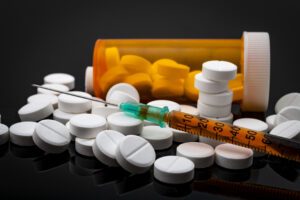
Doctors frequently prescribe oxycodone to treat pain. Its most common brand names are Oxycontin, Percodan, and Percocet. Oxycodone is effective at relieving pain when used for a short period. However, oxycodone is an opioid and can be very addictive. Some people who start taking oxycodone for pain may continue to use it or may begin to develop a dependence on it. When this happens, they may need help to stop using oxycodone. Opioid addiction has serious consequences for people’s physical, social, and mental health. It is important to enter treatment as soon as you identify symptoms of opioid addiction.
If you or someone you love need help with a substance use disorder, including oxycodone addiction treatment, please reach out to the staff at Northern Illinois Recovery Center. We offer a range of supportive programs that will help you work towards recovery from substance abuse. Please call 855.786.1978 or fill out an online intake form here.
Jump to Section
What Are the Signs of Oxycodone Addiction?
The first step towards recovery is recognizing the signs of addiction. There are many noticeable symptoms of oxycodone addiction, including:
- Inability to manage responsibilities at home, work, or school
- Spending a lot of time getting, using, and recovering from the drug
- Using oxycodone despite suffering negative consequences
- Needing more oxycodone to get the safe effect
- Having withdrawal symptoms when reducing or stopping use of oxycodone
In addition to these signs, someone abusing oxycodone may have uncomfortable physical symptoms like constipation, confusion, sweating, nausea, dry mouth, and hallucinations.
What Happens During Oxycodone Addiction Treatment?
With prolonged use, the body adjusts to the presence of opioids in the system. When someone stops or cuts back on the amount of oxycodone they use, their body struggles to adjust to the absence of the substance. This can result in uncomfortable or dangerous symptoms of withdrawal. Withdrawal from oxycodone can be especially difficult. You should have medical supervision during this process so that you can withdraw safely and completely. During treatment for oxycodone addiction, you will have medical professionals to monitor and treat your symptoms. You will also receive support to help you avoid returning to oxycodone abuse. This is important because cravings for opioids can be very strong during the withdrawal period. After a safe, complete detox process, you will receive guidance for the next level of care you need for long-term sobriety.
What Level of Care Do I Need for Opioid Addiction Treatment?


Learn More About Oxycodone Addiction Treatment at Northern Illinois Recovery Center
If you or someone you love need supportive oxycodone addiction treatment or other mental health or addiction programs, please reach out to the staff at Northern Illinois Recovery Center. We offer a range of services to help you in recovery, including:
- Women’s addiction treatment center
- Men’s addiction treatment center
- Young adult addiction treatment center
- Telehealth rehab program
- Extended care (90-day program)
- Dual diagnosis treatment
- Medication-assisted treatment
If you are ready to take the first step in your journey to life-long recovery, we are ready to walk the rest of the way with you. Call our staff today at 855.786.1978 or fill out an online intake form here.


Licensed Physician and Surgeon
Dr. Beth Dunlap, a board-certified addiction medicine and family medicine physician, and is the medical director at Northern Illinois Recovery Center. She is responsible for overseeing all the integrated medical services at both campuses. Beth completed medical school, residency, and fellowship at Northwestern University, where she continues to serve on the faculty as a member of the Department of Family and Community Medicine. She has extensive experience in addiction medicine at all levels of care, and her clinical interests include integrated primary care and addiction medicine, harm reduction, and medication-assisted treatment.



